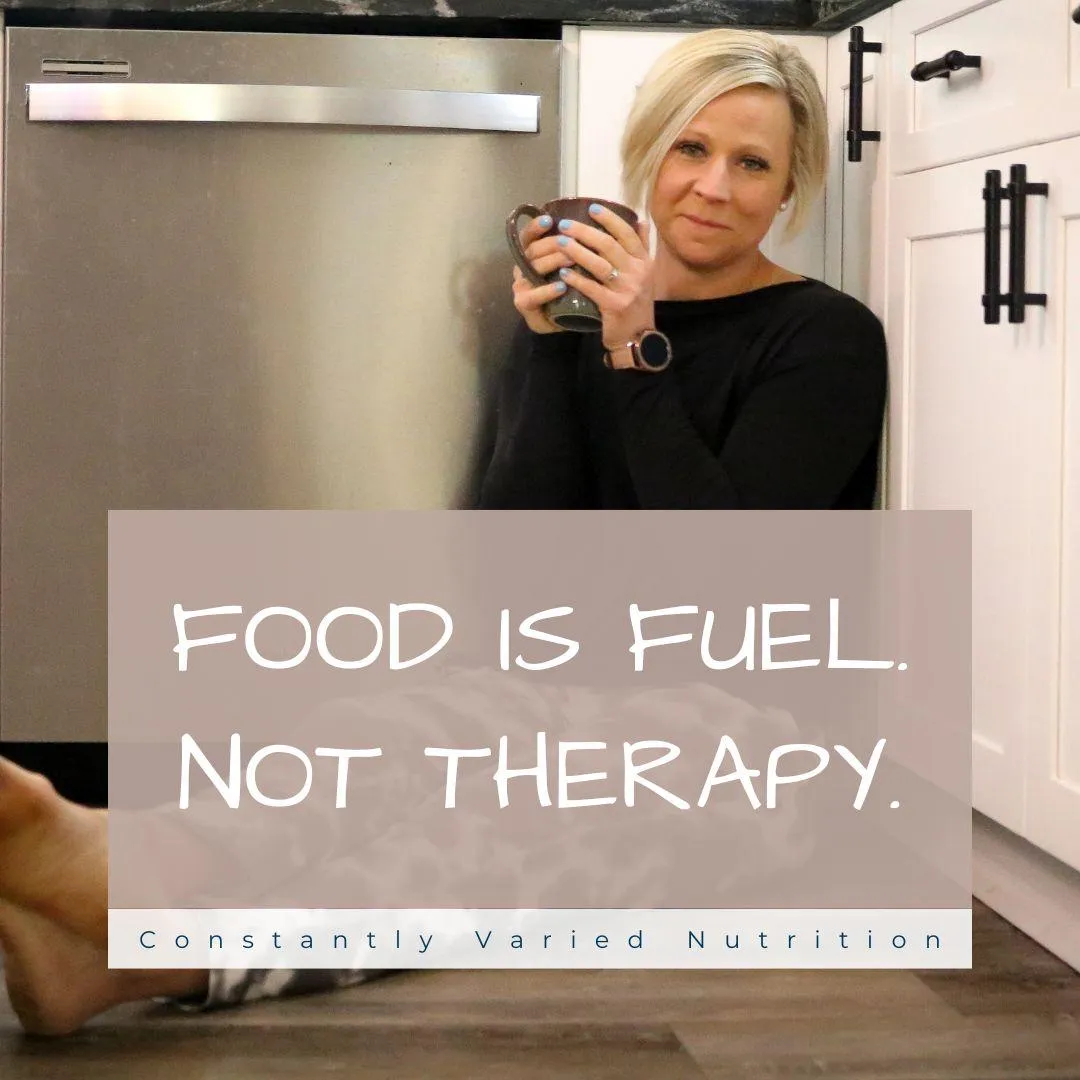Constantly Varied Nutrition Blog
It is our mission to educate and create an impact in the community by bringing nutrition to the forefront of health. Let us educate you about how to fuel your body optimally to balance your body's systems while keeping you active.

Fuel Your Body, Not Your Emotions
“Eating to turn off feelings doesn't fully appease your feelings; instead it just ads more psychological (and caloric) weight to the experience.” - Jennifer L. Taitz
FUEL YOUR BODY NOT YOUR EMOTIONS
I’ve been there. It starts with good intentions and you just have a little bite. Then you get distracted by whatever you are doing or the taste fills you with all the positive emotions of every time you’ve eaten it before and the next thing you know you’re elbow deep in a pint of ice cream or the entire bag of chips is gone. What in the world just happened!? Then, the guilt ridden shaming begins. You go to bed exhausted and sick, feeling out of control and like you’re sabotaging yourself.
Can you relate?
It’s called emotional eating, and it happens more often than you might think. This feeling can strike at any time, when you find yourself eating for reasons other than satisfying actual physical hunger. If you’re an emotional eater, you may find yourself eating to deal with uncomfortable emotions, using food as a reward when you’re happy, and craving sweets or unhealthy snacks when stressed. Don’t worry, you’re not alone and I have some tips to help you better manage your emotions instead of reaching for the bag of chips.
Like anything that requires change, awareness is learning to embrace the uncomfortable situation for face value. Emotional eating provides a release from discomfort, providing a momentary sense of pleasure and satisfaction when you’re feeling something you don’t want to feel. Overeating has a numbing, softening effect on our unwanted sentiments, and takes our attention away from them for a short period of time. Learning to not abandon yourself when your emotions go awry, but instead to invite them in and allow yourself to feel them is the key to stopping the cycle.
This means sitting with uncomfortable thoughts and feelings that you might have been abandoning for too long. What is it that you are really going through right now? Welcome your negative emotions with kindness and curiosity, and ask them what they want from you. This includes those intense feelings of guilt or anger that tend to follow an emotional eating episode. By listening to and working through your emotions, you’ll discover what it is you truly want, and can create new strategies to resolve the issue instead of using food to numb it out.
Stress eating is also known as "mindless eating" because we often don't think about what we're doing, and let our unconscious habits or drives take over. Think about the times you sit on the couch after dinner with the bag of pretzels and find yourself with an empty bag when the show is over.
The trick is to be more aware of why you're eating when you eat. One way to check-in with yourself if you find yourself in a situation that you may be mindless munching. Once you take a second to pause and think, you may realize you're eating for the wrong reasons or just because you are bored. Then you can go back to the first topic of sitting with those feelings that are uncomfortable and deal with your feelings. Once you break the habit of mindlessly reaching for food, it becomes easier to notice when mindless eating happens.
Learning how to manage your triggers.
You know the foods that you have to be very wary of when you have them in open containers in the house. If you know what those foods are, you can strategize and create a plan to redirect yourself when you feel yourself face to face with a triggering food or the emotions that will bring on a search for those foods. What are some non- food ways you can deal with stress, anger, frustration, boredom, sadness or loneliness? Make a list and when presented with those emotions you’ll have easy access to things that you can do that don’t involve eating. Pack your calendar with exciting things to do, be disciplined about setting aside time for yourself to relax, journal, read a book, call a friend, go for a walk. Emotional eating can also be your body’s instinctive reaction to feeling deprived. Your hunger will get away from you when you’re not eating enough. Your body naturally craves sugary, calorie dense foods when stressed to help it cope. A good way to combat these types of cravings is to create new ways to nourish yourself optimally. Eat to fuel your life and help your body thrive by stocking your fridge with delicious, healthy foods that are nutrient dense.
Eat when you are actually hungry.
For every diet, there’s an equal and opposite binge. This means that you need to listen to your body and get honest with yourself about your inner dialog. Is it hunger you’re feeling or are you craving something to sedate an emotion? Ask yourself what emotion you're feeling in that moment? Are you Sad? Frustrated? Angry? Lonely? Those are emotions you can fix by acting on them appropriately...
Food doesn’t fix emotions, it fixes hunger. So instead, eat real, healthy, and nourishing foods whenever you experience physical hunger. You do not need to deprive yourself from any food group or deem something as unhealthy, but there is a balance that has to occur in what you’re putting in your body to achieve overall health. All food is food that has the ability to nourish your body and your mind. Both have a place in your life for you to enjoy and find peace with all foods in moderation.
Do you feel that you have times of emotional or stress eating? It’s ok to say yes. Awareness is the first step to navigating it differently. Can you identify when these times happen? If so, that’s awesome because that allows you to increase that awareness and change your dialog. If not, that’s ok too. This is something that you can start to look for inside each day so that you can work towards changing your dialog. Let’s make this topic less taboo and open up the conversation in order to help each other through similar experiences!
Yours In Imperfect Action,
Dana

